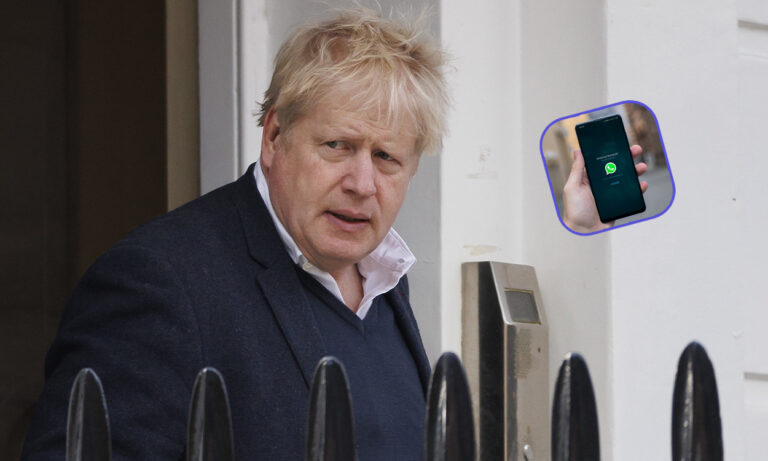WhatsApp’s disappearing messages tool may become permanent, and we’ve got politicians to blame

In a world where instant communication is the norm, WhatsApp has emerged as a dominant force—connecting people across the globe with its user-friendly interface and robust encryption. It saved us from the perils of exorbitant fees for every single text message sent, in turn liberating us from the shackles of limited communication and allowing us to type paragraphs upon paragraphs of our innermost thoughts without breaking the bank.
Not only did WhatsApp rescue our wallets, but it also brought us closer together. Long-distance friendships became more manageable as we connected with friends across the continent.
But, as it turns out, while we were sending each other TikToks and memes about The Real Housewives of Beverly Hills, some of the UK’s most prominent politicians were hatching their schemes and spilling their dirty secrets on the very same app. While we were busy celebrating our technological freedom, politicians were discreetly huddling in encrypted group chats, sharing confidential information and plotting their next moves.
As politicians first flocked to the instant messaging app, they saw it as a safe space, a virtual fortress where they could strategise and conspire away from the prying eyes of the public and the media. Their encrypted group chats acted as a digital version of Dune’s cone of silence, shielding their discussions from unwanted scrutiny. Or that’s what they thought…
Enter the infamous COVID-19 pandemic—you remember, the crushing medical crisis that decimated the entire country, completely crippled our healthcare system and had us all going loopy baking banana bread at home. Well, as we baked and brewed, politicians turned to WhatsApp to navigate the treacherous waters of the pandemic.
They thought they could coordinate their responses and keep us all informed, but oh boy, did it backfire. The closed nature of these encrypted groups meant that vital information was trapped within the confines of a select few, leaving the rest of us feeling like that one gen Zer who didn’t bring a vape to the afterparty.
Rumours ran rampant, misinformation spread like wildfire, and suddenly, WhatsApp became a breeding ground for chaos and confusion. It was like watching a bad soap opera where everyone had a secret, and the truth was hidden behind layers of encrypted messages. We were left scratching our heads, wondering if we could trust anything that came out of these digital sanctuaries.
Earlier this year, a hoard of over 10,000 WhatsApp messages, aka the pandemic diaries, were released to the public. Within them contained the intimate conversations between a handful of incredibly senior politicians. And with the scandal came societal conversations regarding the role modern communication technology such as the messaging app might play in politics.
Within some of these leaked messages, were conversations that included former Prime Minister Boris Johnson—conversations that were definitely not meant for public consumption. It’s the stuff of tabloid dreams and political nightmares. The content of these messages ranged from eyebrow-raising banter to highly disrespectful and crude exchanges.
While the fallout from these leaked messages has been both chaotic and entertaining—I mean, it was a classic case of politicians being caught with their digital pants down—let’s not forget the broader implications for all WhatsApp users. This scandal serves as a stark reminder that our digital conversations are never truly private. No matter how secure we think our encrypted chats are, there’s always a chance that our words may find their way into the public domain. It’s a sobering thought, especially considering the intimate and personal nature of our everyday conversations.
How will Chat Lock and disappearing messages change the nature of WhatsApp?
In an interesting turn of events, on 15 May, WhatsApp launched a new feature called Chat Lock, which allows users to put a specific convo in a private folder that can only be accessed if you enter the password or pass the biometric security gates. It’s been gaining traction among gen Zers who’re seeking a more secure and intimate communication experience. It’s almost like WhatsApp is trying to reinvent itself, shifting from a reliable messaging platform, to a Snapchat-esque haven for private conversations.
Another feature that’s been rolled out recently is the disappearing messages tool, which allows netizens to click on a certain conversation and change the settings so that every 24 hours, seven days, or 90 days, the messages anyone sends within that chat will completely vanish. It’s like a digital game of hide and seek, where your messages leave no trace behind. This new feature has captured the attention of those who crave a sense of ephemeral privacy, reminiscent of a similar tool Snapchat introduced in the past. While the feature is currently optional, there’ve been rumours swirling online that it could eventually become permanent.
The timing of this release couldn’t be more perfect. As the Johnson scandal unfolds and highlights the potential pitfalls of private messaging, WhatsApp seems to be pivoting towards a more temporary and transient approach. It’s as if it’s saying, “Hey, we understand your concerns about privacy and the longevity of your messages. Here’s a solution that allows you to communicate with peace of mind.”
But will WhatsApp successfully transition into a Snapchat-like platform? Only time will tell. While Snapchat has carved out its own unique niche in the social media landscape, WhatsApp has its own loyal user base, primarily due to its reliability and encryption features. Whether users will embrace this new direction or prefer to stick with WhatsApp’s tried-and-true messaging capabilities remains to be seen. In the meantime, let’s chat cautiously, embracing the evolving nature of our digital world. And let’s remember that privacy, even in the digital realm, is a precious commodity.





